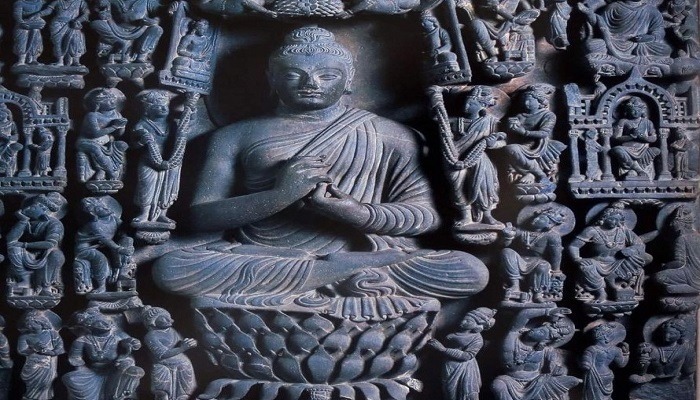Buddha Gets Multiplied in Terracotta Etc.
By Chronicler
Not very far from the ruined Buddhist monastery aka Julian, Zardad along with his brother ventured into creating variety of Buddha statuette, bust and replica of different artefacts related to spiritual head of world’s oldest religion, whose early footprints are largely scattered all around Taxila.
Though the pioneering brothers have been pushing up daisies but this flourishing business in Muslim majority Pakistan has survived all odds.
Buddha’s statues are being crafted in Taxila, an art which has been passing from one generation to other, although Buddhism followers are the smallest in number and there is only one functional Buddhist temple in Pakistan.
The only working Buddha temple is situated in Diplomatic Enclave in Islamabad which is used by Buddhist diplomats of different countries.
However, despite minimal presence of Buddhist in Pakistan the crafting of Buddha’s replicas is in practice in Taxila which date back to era of pre-partition of the Sub-Continent.
 A craftsman working on stone with his tools to make Buddha’s statues. A craftsman working on stone with his tools to make Buddha’s statue. Crafting of Buddha’s statues continues in Taxila for buyers abroad
A craftsman working on stone with his tools to make Buddha’s statues. A craftsman working on stone with his tools to make Buddha’s statue. Crafting of Buddha’s statues continues in Taxila for buyers abroad
Taxila

These statutes are carved from black schist stone which is dug out from areas like Swabi and Charsadda of Khyber Pakhtunkhwa (KP). Replicas of Buddha are manufactured in different postures likes that of teaching, preaching, meditation and others.
Muhammad Mustafa and Muhammad Zardad, the two real brothers were the pioneers in crafting statues of Buddha and their families continue to earn their livelihood from this art.
The statues of Buddha which were found from the archaeological sites of Taxila were made of limestone but the craftsmen associated with manufacturing replicas of Buddha’s use black-schist stone for the purpose.
So technically they are not making replicas of Taxila’s civilization and doing something which was centuries of ago was practiced in areas of Gilgit and Swat. Moreover, they also add some other features to these statues of their own which make them distinctive when compared with original antiques in this respect.
Buddhism in Pakistan has a long history which took its roots over here some 2,300 years ago during the period of King Ashoka.
However, in nowadays’ Pakistan the Buddhist population in Pakistan hardly calculates to a few thousands and most of it is settled in areas of Sindh and Punjab. Even this population got nothing to do with manufacturing of Buddha’s statutes and it’s done by a few individuals who are Muslim. Besides manufacturing statues of Buddha, the families associated with this business also craft statues of different deities having origin in Greek mythology and Hinduism.
All these statues are manufactured for antique lovers living abroad in countries like USA, Korea, Japan, Thailand, China and few countries of Europe. These replicas are further processed to give them the look of antiques. Even these techniques require rigorous labour and they’re an art themselves.
According Tahir Suleman, an expert on Taxila Civilization this art got real boost in 70’s and 80’s when Afghan war started. Europeans and USA citizens were the prime buyers of these replicas and the craftsmen used to get good income out of it. But still they got a market abroad which has its own mechanism and shipment procedure, he added.
He said the families associated with manufacturing of statues of Buddha and others have workshops at their homes and it’s their sole source of income as they know nothing else for earn livelihood.
Both Mustafa and Zardad were illiterate and they passed away some 20 years ago and people in their families are still following their tradition and earning descent amount for living out of it.
In past some exhibitions of these statutes of Buddha were made at different platforms especially at Rawalpindi Arts Council.
Though shipping these statutes abroad has become difficult but it got its own network and delivery system. Some people like them and buy them as antique but a few others want to have them to fulfill their religious demands in countries like Japan and Korea.
Ends



